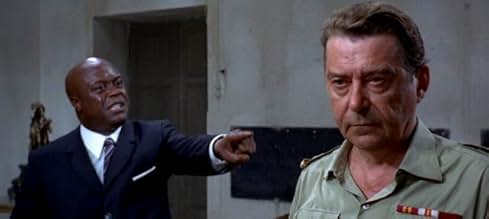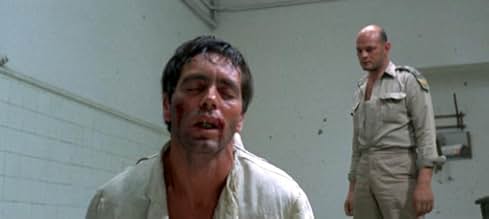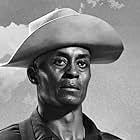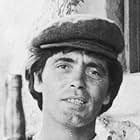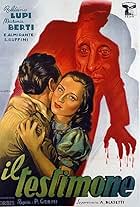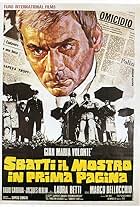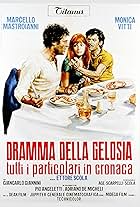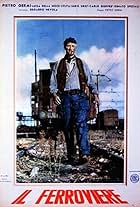Rebel Maurice Lalubi is arrested by the military on trumped up charges and tortured, which turns him into a martyr. Inspired by the final days of the first democratic Congolese leader, Patri... Read allRebel Maurice Lalubi is arrested by the military on trumped up charges and tortured, which turns him into a martyr. Inspired by the final days of the first democratic Congolese leader, Patrice Lumumba.Rebel Maurice Lalubi is arrested by the military on trumped up charges and tortured, which turns him into a martyr. Inspired by the final days of the first democratic Congolese leader, Patrice Lumumba.
- Awards
- 3 nominations
Stephen Forsyth
- Il prigionero violento
- (as Stephen Forsyte)
Luciano Catenacci
- Il sergente
- (as Luciano Lorcas)
Bruno Corazzari
- Un torturatore
- (uncredited)
Inigo Lezzi
- Un soldato
- (uncredited)
Storyline
Did you know
- TriviaOriginally planned as an episode of the collective movie Love and Anger (1969), it was eventually expanded to a feature length.
- ConnectionsReferenced in Come of Age (1971)
Featured review
It's funny that one of the alternate titles for this film is "Super Brother"! "Super Brother"?! I guess they must have been referring to the iconic super-athlete-turned-actor Woody Strode and trying to sell this brilliant, Pontecorvo-esque Battle-of-Algiers-Queimada-Burn-like 1968 anti-colonialist political Italian film to a blaxploitation/spaghetti-Western/action-film crowd! Zurlini's film is definitely hardcore, violent, and has some action, but it is anything but blaxploitation; even with all its flaws it's one of the fantastic achievements of the politically committed 'Marxist' cinema of the period, at the very least, on the level of Pontecorvo's much more widely seen "Burn," starring Marlon Brando. Snobs and perfectionists may disagree with that assessment but real film fans know that imperfect, flawed films are often far preferable in every way to films that play by the rules and criterion set-up by bozo mainstream critics. "Black Jesus," and most of Zurlini's other films are underrated masterpieces that have slipped through the crack of history and are ripe for rediscovery. I thoroughly enjoyed all 8 of Zurlini's films screened at UCLA recently and would buy at least 6 of them on DVD tomorrow if they were available. All 8 of them should be put out on good DVDs, not cut-up pan-and-scan videos (and especially, "Black Jesus" because it was shot in 2.35:1 widescreen)!
One of the flaws associated with the film is that it was post-production dubbed in the typically bizarre sounding Italian style of that era but to me that's not a big problem: the film itself being intentionally played slightly 'over-the-top' this 'aural distancing' only adds to its surreal, dreamlike, hypnotic, and totally flabergasting power. "Black Jesus" is a dramatic re-creation of events that actually happened (again like Pontecorvo's "Burn"), though the names and locales have been changed to wisely avoid accusations of historical innaccuracy with regard to details. The entire film has one major purpose: to put you in direct contact with the brute facts of colonialism and make you very mad that injustice goes unpunished, and it uses parable to drive its point home. The long, meditative, almost Antonioni-paced prison conversation between Strode and his unlucky knave of a cell-mate as he awaits the sure to be bleak fate of one who doesn't compromise with tyrants, sets up one of the most harrowing and shattering torture scenes in cinematic history (harder to take than anything in Midnight Express or Reservoir Dogs). Not one inch is granted to audience sensitivities and conditioning and their need to have 'escapist' entertainment; the entire film is completely uncompromised, bleak, hard-to-take, powerful, and in the final analysis, a truly awesome achievement that transcends all its flaws.
One of the flaws associated with the film is that it was post-production dubbed in the typically bizarre sounding Italian style of that era but to me that's not a big problem: the film itself being intentionally played slightly 'over-the-top' this 'aural distancing' only adds to its surreal, dreamlike, hypnotic, and totally flabergasting power. "Black Jesus" is a dramatic re-creation of events that actually happened (again like Pontecorvo's "Burn"), though the names and locales have been changed to wisely avoid accusations of historical innaccuracy with regard to details. The entire film has one major purpose: to put you in direct contact with the brute facts of colonialism and make you very mad that injustice goes unpunished, and it uses parable to drive its point home. The long, meditative, almost Antonioni-paced prison conversation between Strode and his unlucky knave of a cell-mate as he awaits the sure to be bleak fate of one who doesn't compromise with tyrants, sets up one of the most harrowing and shattering torture scenes in cinematic history (harder to take than anything in Midnight Express or Reservoir Dogs). Not one inch is granted to audience sensitivities and conditioning and their need to have 'escapist' entertainment; the entire film is completely uncompromised, bleak, hard-to-take, powerful, and in the final analysis, a truly awesome achievement that transcends all its flaws.
Details
Box office
- Gross US & Canada
- $331,587
- Runtime1 hour 29 minutes
- Sound mix
- Aspect ratio
- 2.35 : 1
Contribute to this page
Suggest an edit or add missing content



